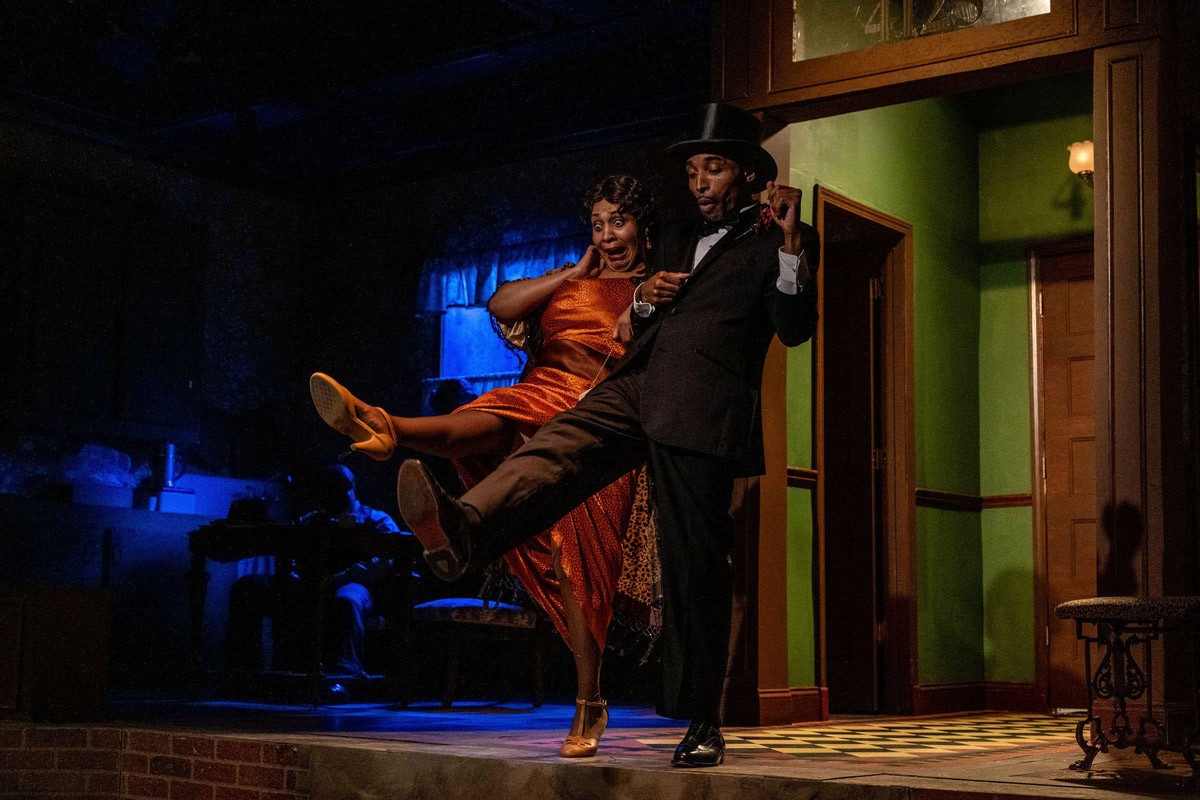Some people will drag you to hell if you let them. It doesn’t matter what you’ve been through together, how much you’ve done for them, or how much you love them — someone who is a black hole of destruction will swallow everyone in their path. It’s their nature.
In Blues For An Alabama Sky, the sweet-talking blues singer Angel is that black hole. The play was written by Detroit native Pearl Cleage and is running at the Detroit Public Theatre until March 3.
In the play, the Harlem Renaissance is on the decline during the Great Depression, and a crew of close-knit friends is trying to navigate love and artistic expression alongside economic hardship.
“Sometimes you have friends that you love who are not going to be good people, who are going to be dangerous and toxic, and you are not going to be able to reform them and make them what you want them to be,” Cleage tells Metro Times about Angel. The character is played effortlessly by Mildred Victoria Penman.
Cleage continues, “She doesn’t have a dream beyond looking out for herself.”
Angel has just gotten fired and can’t find work as a performer anymore. Her gay roommate and costumer Guy (Izaya Spencer) is sending his handmade dresses to his friend Josephine Baker in Paris in hopes that she’ll send for him and he can escape to Paris. Both Angel and Guy have resorted to sex work in the past to get by, and Angel has found herself there again as a last resort. Meanwhile, their neighbor and social worker Delia is trying to open the neighborhood’s first family planning clinic. She finds an unlikely ally and love interest in their mutual friend Sam, a doctor who has performed illegal abortions.
“We have such a romanticized idea about the Harlem Renaissance when we look back on it,” Cleage says over the phone. “Once the Depression came a lot of the patrons lost everything, so they could no longer afford to support artistic work because they were trying to worry about survival like everybody else. So I thought it would be interesting to look at what happens to a vibrant, thriving, artistic community when all of a sudden the resources that have been supporting it are gone.”
Things come to a head when a mysterious stranger from Alabama named Leland, who turns out to be a conservative homophobe, falls for Angel. A southern Christian trying to court a jazz singer turned sex worker whose best friend is a flamboyant gay man is a recipe for a disaster. But Angel is so hell-bent on Leland being her meal ticket out of her destitute situation, that she pretends to be someone she’s not and asks her friends to do the same.
The play hits on a myriad of issues like reproductive rights and homophobia, that are ever present today with the repeal of Roe v. Wade and “Don’t Say Gay” laws. While Blues for an Alabama Sky isn’t subtle in its political undertones, Cleage says her focus is always to tell a good story first and make people reflect on these issues second.
“Of all the plays I’ve written this one is probably produced the most because people are in love with these characters, but also because the questions are still so important and can be looked at in the context of a great story,” she says. “My aim is not to preach to people because I don’t think that’s why people go to the theater. People go to the theater because they want to hear a story… and if you do it right, then people will also consider the questions that are on your mind as a writer.”
The pacing of the play and the character development feel very smart. The audience gets to know and love the characters like friends, which makes their hurdles on the road to reaching their dreams feel more real. You want them to win. While Guy is the friend who is always there for you, no matter what, Angel just can’t seem to escape her cycle of poor decisions.
“I believe that we make our worst decisions as human beings when we’re frightened,” Cleage says. “And that’s the problem with Angel… she never escapes fear. Of all the characters, she never learned any lessons that would change her.”
There is a concept in the Yoga Sutras of Patanjali about having compassion for unhappy people while disregarding those who can be viewed as “wicked.” Sutra 1.33 roughly translates as “By cultivating attitudes of friendliness toward the happy, compassion for the unhappy, delight in the virtuous, and disregard toward the wicked, the mind-stuff retains its undisturbed calmness.”
“Wicked” is a bit of a harsh word, but this sutra sums up the lesson in Blues For An Alabama Sky. Have compassion for people who are going through tough times, share happiness with other people who are joyful, and don’t engage with toxic people or those with opposing views if you want to keep your peace. That last one is important, especially when those opposing views are extreme enough to get someone killed.
Cleage wants viewers to remember that the most important thing, however, is their responsibility to themselves.
“What is your responsibility to protecting yourself and to creating around you an atmosphere where you tell the truth and you require that people around you do the same?” she asks.
Blues For An Alabama Sky is on at the Detroit Public Theatre until March 3. For tickets and showtimes, see detroitpublictheatre.org.
Subscribe to Metro Times newsletters.
Follow us: Google News | NewsBreak | Reddit | Instagram | Facebook | Twitter







